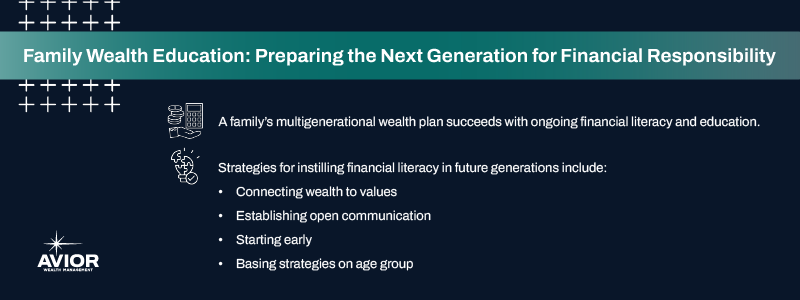Family Wealth Education: Preparing the Next Generation for Financial Responsibility
By Sharlee L. Cretors, MBA, CFP®
Instilling financial literacy in your children early is important for multigenerational wealth management. Learn actionable strategies for success.

Preserving and growing multigenerational wealth is a big responsibility. Parents have to ensure that they’re not only explaining money to their kids but also educating the next generation on personal, ethical, and financial values and what these responsibilities entail.
In this overview, I’ll provide key considerations and actionable strategies to equip parents with the skills to instill financial literacy in their children. Knowing how to talk to your kids about money and the responsibilities and values around it helps preserve and grow multigenerational wealth.
Why family wealth education matters
At Avior, advisors help clients think about multigenerational goals and how their wealth will impact lives. It’s common, even for families that have amassed millions of dollars, to find that their wealth is completely exhausted after four generations. This happens from a lack of knowledge and education around what it means to be wealthy and how to handle that responsibility appropriately.
Additionally, there is often a lot of emotional baggage that gets passed onto children when their parents have generated substantial wealth. Kids may feel entitled to what their parents have, or, on the opposite end, they might feel completely paralyzed by it and afraid to touch it.
If parents don’t pursue family wealth education strategies, making sure finances are going to the right places and being used properly, situations often arise where children feel controlled by or averse to money. Parents can contribute to deflating their kids’ ambitions by giving them money without education.
This can be avoided with several intentional strategies, detailed next.
Strategies to instill financial literacy in the younger generations
It may seem obvious, but kids aren’t born with financial literacy. They need guidance and education to act responsibly and achieve both their goals and the family’s. The strategies listed below can help parents educate and build knowledge around wealth.
1. Connecting wealth to values
Parents must establish what their family values are, and they can’t expect their children to have values that they themselves don’t uphold. Parents must emphasize that wealth brings responsibility, which requires thinking of the larger community and the outside world.
Parents can have conversations with their children about what matters to them personally, and why it’s important to give back time and money.
2. Establishing open communication
Open communication and transparency are both key to family wealth education. A family needs to be able to talk openly about money, values, and goals. Parents can ask their children questions about how they view money and why. How do they see the world? What are their beliefs and goals? It needs to be a dialogue, not a monologue.
Often, parents don’t want to handicap their children’s ambitions by giving them too much money too soon. But there is joy in giving gifts now rather than waiting until you’re gone. There’s a balance, and it starts with communication early and often. Family wealth conversations can often be started and facilitated by a financial advisor with the expertise and temperament to handle complex and sometimes heated topics.
In the long run, it really benefits children to see how their parents make money and how they utilize it as a family. Otherwise, collaboration won’t be easy.
3. Starting early
Children are very curious by nature, and childhood is a good time to start their understanding of money. Parents can start explaining money in a way that’s interesting to children and put it in terms they understand. Children don’t understand economics or the news, so use candy, for example, to explain how money works.
Travel is important for children, too, as it allows them to see how other people live and what is happening in the world beyond their neighborhood.
Christmas provides a great opportunity to teach trade-offs as well. Parents can encourage their kids to give their toys to families in need and emphasize that Christmas isn’t just about receiving gifts; it’s about giving them, too.
4. Basing strategies on age group
Of course, different strategies are required for each stage a child is in. Here are a few considerations for young children, teenagers, and young adults:
- Young children: As mentioned above, young children need to see trade-offs and discover that the world is bigger than they are. Kids will usually have a hard time seeing outside themselves unless you teach and show them.
- Teenagers: Parents should consider what’s important to their teenagers when explaining values and asking questions. For example, ask your teen what technology they’re into or social media platform they like the most before diving into a tailored financial concept. It’s a good idea for teens to get involved with volunteering, also, and think about what they want to do after high school. Teens should see that they can achieve their dreams, but there are trade-offs financially, so their goals need to be feasible.
- Young adults: When young adults are entering an educational program or graduating college, they need to start budgeting for their lifestyle. They’ll need to learn how to pay bills and rent, and what it takes to buy a house. Then, they can align their budgets and jobs to what they want to achieve.
Thinking through these different stages ensures parents can set their children up for success. Financial education should be proactive and ongoing. Following is more detail about nurturing the right mindsets.
How to nurture growth and philanthropy mindsets
The next generation needs to grasp that their family’s money is related to the legacy they want to leave through the generations. This includes the world beyond their limited scope. Emphasizing that time and money are both resources they can give helps them understand responsibility.
If children aren’t in a place to donate to a cause yet, they can contribute their time to something they care about. Families can take on projects together, like adopting a less fortunate family around the holidays and providing thoughtful gifts or services to that family.
These value systems start young. Kids love shopping for toys but they need to see the importance of also giving to others. These lessons can be made fun and light to teach them successfully.
Engage children by asking them about things they care about, like technology or social media. Talk about the meaning behind a new purse they want to buy. Help them do research and understand the larger world around their interests.
Create open forums and opportunities for discussion. Avoid speaking in absolutes. For example, if a teenager wants to buy a fancy car, parents should have their teenagers analyze what that car means to them. They shouldn’t immediately react by saying “It’s stupid or ridiculous.” Children should feel like they can discuss these things, and then they can understand them better and create more positive mindsets.
Why leverage professional guidance?
When focusing on multigenerational wealth management, professional advice complements financial education. Financial advisors help parents educate their children based on their level of understanding, and encourage and facilitate positive collaboration.
Family wealth education helps families create strong foundations for the coming generations and their financial futures. A family’s legacy can be sustained by instilling knowledge, values, and financial literacy.
Avior advisors help families consider multigenerational wealth and financial responsibility. Talk to our experts today to start setting your goals and educating the next generation.
Byline: Sharlee is the president of SC Financial Services, a DBA of Avior Wealth Management LLC. Having worked in the financial services industry for over 30 years, she currently specializes in assisting individuals and their families with the complexities of planning for and creating multi-generational wealth. Seeing the burden of parents who want to provide for their children yet not inhibit their personal growth, she builds financial plans around these intentions so that the entire family can contribute to their communities. Sharlee sees education and communication as the best ways to assist these families as they navigate transitions to the next generation.
Disclaimer: Nothing contained herein should be construed as legal or tax advice. Avior and our Advisors will work with your attorney and/or tax professional to assist with your legal and tax strategies. Please consult your attorney or tax professional with specific legal and/or tax questions. Investment Management and Financial Planner are offered through Avior Wealth Management, LLC, an SEC-registered investment advisor. Past performance is not a guarantee of future results. Investments are subject to loss, including the loss of principal.
No Comments
Sorry, the comment form is closed at this time.




